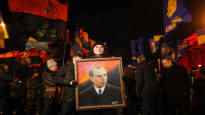Decades ago, the Kremlin’s communications live and are repeated as a weapon against Ukraine’s sovereignty. This is partly due to Putin’s talk about Nazi leaders in Ukraine, writes journalist Johannes Blom.
The European granary Ukraine is a huge, strategically important intermediary between East and West, haunted by famine, the Holocaust and persecution in its violent history.
All of the above are intertwined into a whole that in many ways underpins the rhetoric used by Putin.
The Soviet Republic of Ukraine experienced a huge famine between 1932 and 1933, killing millions of Ukrainians. The famine is called the Holodomor, the starvation.
The disaster almost 100 years ago is still rubbing between Russia and Ukraine. Russia does not recognize the disaster as genocide, as not acknowledged (switch to another service) Recent, pro-Russian president of Ukraine Viktor Yanukovych.
Famine winged nationalism rise in the Soviet Republic of Ukraine. Young nationalist Stepan Bandera joined the armed organization of Ukrainian nationalists in the turn of the 1930s, and rose rapidly in the hierarchy of the organization.
During World War II, in the early 1940s, Ukrainian nationalists worked against the Soviet Union in cooperation with Nazi Germany, believing it to wing the nation’s independence from the Soviet Union.
During the Nazi occupation of Ukraine, Ukraine was even killed 1.5 million Jews (switching to another service). Some local nationalists also assisted the Nazis in the genocide, but turned to fight the occupation later in the 1940s, when the Nazis even executed their former collaborators.
Bandera was liberated from Sachsenhausen in 1944 and settled in Munich, where he continued his anti-Soviet activities as a controversial figure also among his own. On October 15, 1959, the KGB poisoned Bandera with cyanide.
In 2010, the President of Ukraine Viktor Yushchenko awarded Bandera the title of Ukrainian Hero.
At the time of the appointment, the pro-Russian Party of Regions was condemned by the pro-Russian saying it is (you switch to another service) “a step towards a more divided Ukraine”.
Yukchenko’s successor, Yanukovych, took away the title of hero from Bandera a year later, but there are still several Bandera monuments in western Ukraine and, according to him, several streets have been named, even in Kiev (you switch to another service).
Bandera was the son of a Greek Catholic Uniate priest and was born in the west, in the territory of the historic province of Galicia, which is still very different from the more eastern, orthodox parts of Ukraine. History is also read differently across the country.
Putin uses his rhetoric in favor of the division of the people and the difficult history.
Russians and pro-Russians who know the history of peoples can take the narrative more easily because the scars of history are deep. Russia also emphasizes its own actions as a deterrent to the Nazis in World War II.
Stigmatization as Nazi has been a fairly common rhetorical stunt in Ukrainian politics. For example, in 2004, Viktor Yanukovych, backed by eastern Ukraine, accused Yushchenko of Naza who later lifted Bandera on a pedestal in a fierce election campaign.
The Nazi allegations are therefore particularly about the schism of eastern and western Ukraine – and the way in which Bandera’s political legacy is presented.
On the other hand, Bandera also declared Ukraine independent, which for many is his primary political legacy. There are several facets to history, what is emphasized depends on the communicator.
In the Russian narrative, Ukrainians are often branded as banners. The contradictory historical figure has become a political weapon to try to further divide the Ukrainian people.
What, then, should be thought of the Ukrainian nationalists and Putin’s Nazi speech? In many European countries, nationalist movements have power, but it cannot justify an attack on another sovereign state.
Almost all states also have their own historical stains that do not reflect the present.
As brothers of the Nazis and a driftwood – rapids boat people, Finns can understand that interpreting a difficult history as a struggle for good or evil is far too simple to be true. Therefore, this is the following example:
Most of the refugees were allowed to stay in Finland, but the extradition of these eight also provoked a heated debate that continued until the 21st century.
Human destinies are horrible and serve as an example, although they cannot be compared to the massacre of Ukrainian Jews by the Nazis. In 2004 Professor Emeritus Heikki Ylikangas Issued by the Government according to the report (you switch to another service) however, most of the Jewish prisoners were not handed over to the Gestapo, nor were Finnish citizens.
The Nazis later executed Ukrainian nationalists who opposed the occupation, and in Finland the brotherhood ended with the burning of Lapland. Historical figures like Bandera can at the same time be national heroes for some, murderers for others. There are no winners in wars.
This is ‘s daily analysis of the current theme of the Russian invasion.
Analyzes from previous days:
